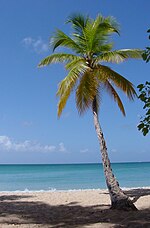Latania
| Latania | |
|---|---|

| |
| Red latan palm | |
| Scientific classification | |
| Kingdom: | Plantae |
| Clade: | Tracheophytes |
| Clade: | Angiosperms |
| Clade: | Monocots |
| Clade: | Commelinids |
| Order: | Arecales |
| Family: | Arecaceae |
| Tribe: | Borasseae |
| Genus: | Latania Comm. ex Juss. |
| Type species | |
| Latania lontaroides | |
| Synonyms[1] | |
| |
Latania, commonly known as latan palm or latania palm, is a genus of flowering plant in the palm tree family, native to the Mascarene Islands in the western Indian Ocean.[1][2]
Species
[edit]The genus contains three species, one from each of the three major islands (including islets) in the chain. All species have been ranked as Endangered by the IUCN.[3]
| Image | Leaves | Common Name | Scientific name | Native Distribution |
|---|---|---|---|---|
 |
 |
blue latan palm, latanier de l'Ile Ronde | Latania loddigesii Mart. | Mauritius |
 |
 |
red latan palm, latanier de la Réunion | Latania lontaroides (Gaertn.) H.E.Moore | Réunion |
 |
 |
yellow latan palm, latanier de Rodrigues | Latania verschaffeltii Lem. | Rodrigues Island |
Latan palms are large, single-stemmed fan palms with separate male and female plants (dioecy); when the leaves fall, they leave scars on the trunks. Male flowers are small, in clusters, and emerge from within leathery bracts on the catkin-like inflorescences. Female flowers are larger, solitary and not concealed within bracts. The fruits contain 1-3 pyrenes, which are seeds enclosed within woody endocarps.[4] The endocarps have sculpted surfaces and the three species are readily distinguished from their pyrenes.[5]
References
[edit]- ^ a b Kew World Checklist of Selected Plant Families
- ^ Govaerts, R. & Dransfield, J. (2005). World Checklist of Palms: 1-223. The Board of Trustees of the Royal Botanic Gardens, Kew.
- ^ "Latania conservation status". www.iucnredlist.org. Retrieved 2018-03-03.
- ^ Dransfield, John; Uhl, Natalie W.; Asmussen, Conny B.; Baker, William J.; Harley, Madeline M.; Lewis, Carl E. (2008). Genera Palmarum - Evolution and Classification of Palms. Royal Botanic Gardens, Kew. ISBN 978-1842461822.
- ^ Bayton, Ross P. Borassus L. and the borassoid palms - systematics and evolution (PhD Thesis). University of Reading.
External links
[edit]
